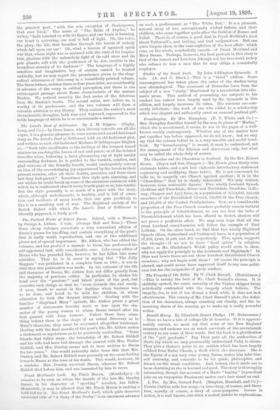The Poetical Works of Robert Burns. Edited, with a Memoir,
by George A. Aitken. 3 vols. (George Bell and Sons.)—These three cheap volumes constitute a very convenient edition of Burns's poems for handling, and contain everything of the poet's that is really worth reproduction, and one or two additional pieces not of special importance. Mr. Aitken, who has edited the volumes, and has prefixed a memoir to them, has performed his self-appointed task with considerable care. Like every editor of Burns who has preceded him, however, he has fallen into some mistakes. Thus he is in error in saying that " The Jolly Beggars " was published in a complete form in 1801 ; it was in 1802 that this publication was made. In his estimate of the life and character of Burns, Mr. Aitken does not differ greatly from the majority of previous critics, In particular, he shakes his head over the " passions " and latest years of the poet, but concedes such things as that he "even towards the end rarely, if ever, drank to excess in the daytime when business was to be done, and loved to be with his children, in whose education he took the deepest interest." Dealing with the familiar "Highland Mary" episode, Mr, Aitken prints a groat number of statements bearing more or less upon the cha- racter of the young woman to whom Burns turned after his first quarrel with Jean Armour. Unless these have some- thing behind them in the shape of an actual discovery as to Mary's character, they must be accounted altogether irrelevant. Dealing with the final months of the poet's life, Mr. Aitken makes a statement so mysterious as to be positively misleading. " Some friends had fallen away ; the friendship of Mr. Robert Riddell and his wife had been lost through the quarrel with Mrs. Walter Riddell, and Mrs. Dunlop seems not to have written to Burns for two years." One would naturally infer from this that Mrs. Dunlop and Mr. Robert Riddell were precisely on the same footing towards Burns at the time of his death. This would, however, be a mistake. Mrs. Dunlop survived Burns, whereas Mr. Robert Riddell died before him, and was lamented by him in verso.


































 Previous page
Previous page